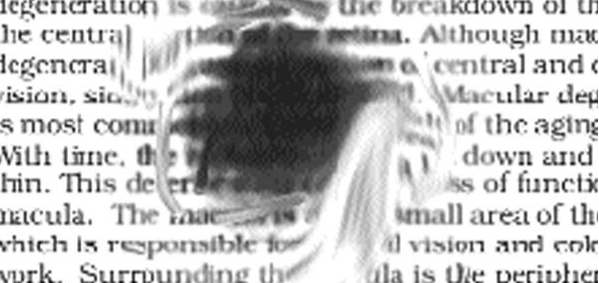Seeing is Believing: Understanding and Coping with Macular Degeneration

Introduction
Macular degeneration is a common eye disease that affects the central part of the retina, called the macula. The macula is responsible for clear, sharp vision, so it can significantly impact a person’s quality of life when it deteriorates.
This article will discuss the different types of macular degeneration, their causes, prevention strategies, treatment options, and tips for living with the condition.
Types of Macular Degeneration
There are two main types of macular degeneration: dry and wet. Dry macular degeneration is the most common form and progresses slowly over time.
Wet macular degeneration, while less common, can cause more severe vision loss in a shorter period. Symptoms of macular degeneration can include blurry or distorted vision, difficulty seeing in low-light conditions, and blind spots in central vision.
Causes of Macular Degeneration
While the exact cause of macular degeneration is unknown, certain risk factors can increase the likelihood of developing the condition. Age is the most significant risk factor, as macular degeneration is more common in older adults.
Genetics also play a role, as certain gene mutations can increase the risk of developing the condition. Lifestyle factors such as smoking, poor nutrition, and lack of exercise can also contribute to the development of macular degeneration.
Prevention of Macular Degeneration
While there is no guaranteed way to prevent macular degeneration, certain lifestyle changes can reduce the risk of developing the condition. A healthy diet rich in fruits, vegetables, and omega-3 fatty acids can promote eye health.
Exercise can also help reduce the risk of macular degeneration by improving overall health and eye blood flow. Avoiding smoking and protecting the eyes from UV light can also help prevent macular degeneration.
Treatment Options for Macular Degeneration:
There is currently no cure for macular degeneration, but treatment can slow the progression of the disease and improve vision. Treatment options depend on the type and severity of macular degeneration.
For dry macular degeneration, antioxidant supplements may be recommended. Medications and laser therapy can be used for wet macular degeneration to prevent further damage to the macula. In severe cases, surgery may be necessary.
Living with Macular Degeneration
Living with macular degeneration can be challenging, but some strategies can help make daily life easier. Using assistive devices such as magnifying glasses and adaptive technologies can help compensate for vision loss.
Seeking support from loved ones and joining support groups can also help individuals cope with the emotional aspects of macular degeneration. Maintaining a positive attitude and focusing on what can be done rather than what cannot also be helpful.
Can macular degeneration be reversed through diet?
While a healthy diet is important for overall eye health, no specific diet or food has been proven to reverse macular degeneration.
However, some studies suggest that a diet rich in antioxidants and certain nutrients, such as vitamins C and E, zinc, and lutein, may help slow the progression of the disease.
Speaking with a healthcare professional before making any significant changes to your diet is important. In addition to a healthy diet, other lifestyle changes, such as quitting smoking and maintaining a healthy weight, can help reduce the risk of developing macular degeneration or slow its progression.
Conclusion
Macular degeneration can be devastating, but with the right treatment and lifestyle changes, individuals can maintain their vision and quality of life. By being aware of the risk factors, taking steps to prevent the disease, and seeking prompt treatment when necessary, individuals can increase their chances of preserving their vision for years to come.
FAQs
What is macular degeneration?
- Macular degeneration is a progressive eye disease that affects the central part of the retina, called the macula. It is the leading cause of vision loss in people over the age of 60.
What are the risk factors for macular degeneration?
- The risk factors for macular degeneration include age, genetics, smoking, poor nutrition, and lack of exercise.
Can macular degeneration be prevented?
- While there is no guaranteed way to prevent macular degeneration, certain lifestyle changes, such as eating a healthy diet and exercising regularly, can help reduce the risk of developing the condition.
What are the symptoms of macular degeneration?
- Symptoms of macular degeneration can include blurry or distorted vision, difficulty seeing in low-light conditions, and blind spots in central vision.
How is macular degeneration diagnosed?
- A comprehensive eye exam, including a visual acuity test, dilated eye exam, and imaging tests, such as optical coherence tomography (OCT), can help diagnose macular degeneration.
What are the treatment options for macular degeneration?
- Treatment options for macular degeneration include medications, laser therapy, and surgery. The treatment options depend on the type and severity of the disease.
Can macular degeneration be cured?
- Currently, there is no cure for macular degeneration. However, treatment can slow the progression of the disease and improve vision.
Can vision loss from macular degeneration be reversed?
- While vision loss from macular degeneration cannot be fully reversed, treatment can help slow the progression of the disease and improve vision.
How does macular degeneration impact daily life?
- Macular degeneration can impact daily life by making performing activities such as reading, driving, and recognizing faces difficult. Assistive devices and adaptive technologies can help individuals with macular degeneration continue to perform these activities.
How can I cope with a diagnosis of macular degeneration?
- Coping with a macular degeneration diagnosis can be challenging, but seeking support from loved ones and joining support groups can help. It is also important to maintain a positive attitude and focus on what can be done rather than what cannot.